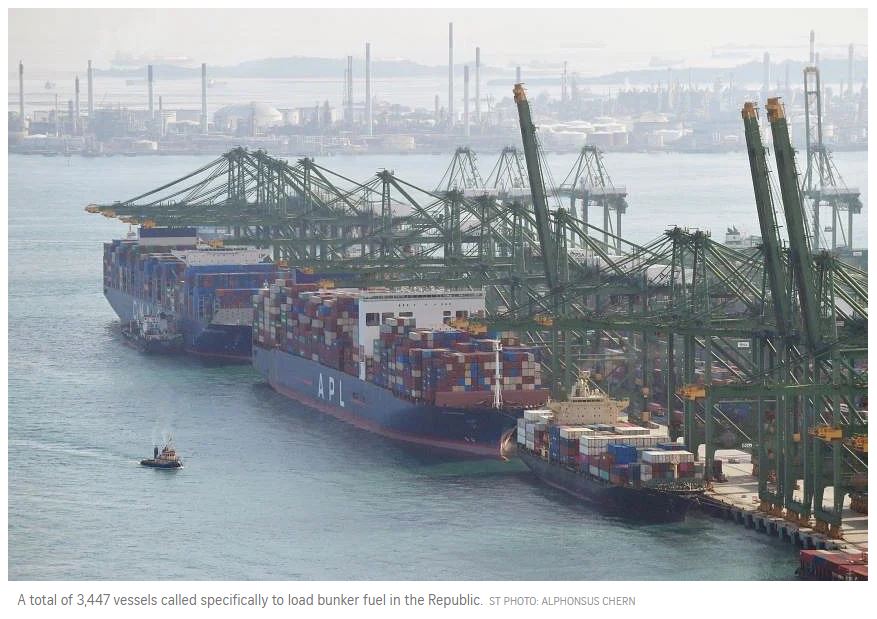Singapore bunker sales up 4% in Jan, but slower growth expected
SINGAPORE – Marine fuel sales in Singapore hit a two-month high in January as more vessels called at the world’s largest hub, taking advantage of lower prices.
Sales rose to 4.38 million tonnes, an increase of around 4 per cent compared with the previous month, according to data released by the Maritime and Port Authority of Singapore (MPA) early last week.
A total of 3,447 vessels called specifically to load bunker fuel in the Republic, an increase of just over 4 per cent compared with December. The previous high was in October 2022.
Mr Emril Jamil, senior oil analyst at Refinitiv, a unit of the London Stock Exchange Group, said on Monday increased demand was likely a result of shipowners not just taking advantage of lower prices, but also loading excess volumes.
This was because they anticipated not being able to purchase bunkers at ports in China due to seasonal closures over the Chinese New Year holidays during the second half of January.
“The impact of sanctions put in place as a result of the Russia-Ukraine conflict has reshaped not only trade flows, but also increased the distances ships are travelling in general,” said Mr Jamil.
“We expect to see increased overall ship arrivals at maritime hubs, like Singapore, particularly as larger vessels provide better cost economics.”
Mr Jamil explained that analysis of data released by the MPA showed that more vessels such as oil tankers, container ships and bulk carriers, which typically transport dry commodities, arrived in Singapore in January.
“This would suggest more demand for purchasing larger volumes of marine fuels at port,” said Mr Jamil.
Contributing to the expanded sales was an increase in demand for marine fuels containing less sulphur.
MPA data showed that sales for the most commonly sought after low-sulphur marine fuel grade rose by nearly 5 per cent in January to 2.3 million tonnes as compared with December.
Sales of high-sulphur marine fuels, which had been steadily rising due to increased availability of cheap Russian blended oil, declined by nearly 8 per cent in January to 1.2 million tonnes as compared with December.
Mr Roslan Khasawneh, a senior analyst at data analytics firm Vortexa, said on Monday the rise in sales of the cleaner marine fuel was likely due to more shipowners wanting to reduce their carbon footprint.
He said: “As shipping rates have now normalised from their peaks over the past two years, and with stricter environmental rules coming into effect, many commercial vessels are dialling back on their speed and reducing their bunker consumption.
But the near-term outlook for bunker sales in Singapore looks weak.
At least one senior trading manager, who declined to be named as he was not authorised to speak on behalf of his company, said it was likely that bunker fuel consumption by container vessels could trend lower over the year as more shipowners look to reduce costs in the light of lower demand and weaker freight rates.
Earlier in February, container shipping giant A.P. Moller Maersk chief executive Vincent Clerc said during a results briefing that the company expects global demand for shipping containers by sea to fall by as much as 2.5 per cent as a build up in inventories is unwound.
He added that freight rates fell by nearly a quarter in the fourth quarter of 2022 compared with the previous three months.
Mr Jonathan Roach, lead container analyst at shipbroker Braemar, said: “With more blanked sailings (cancelling a scheduled port call or voyage) and a dip in demand, especially on trans-Pacific voyages, vessel speeds have been slowed to mitigate lower utilisation levels and could remain at these lower levels for most of 2023.”
He added: “Bunker demand for container ships over the next few months and into the summer is likely to record a dip compared with the corresponding point in 2022.”
Source: https://www.straitstimes.com/business/s-pore-bunker-sales-up-in-jan-but-slower-future-growth-expected-due-to-weaker-outlook-for-container-shipping-sector


 Thailand
Thailand




